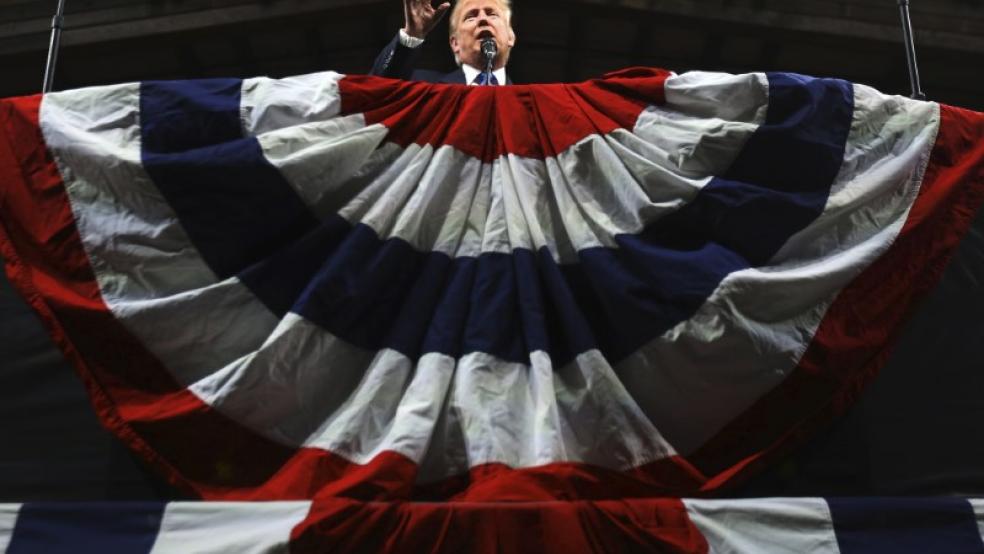There may be no better summary of the bind that the Republican Party finds itself in right now than an appearance Senate Majority Leader Mitch McConnell made on a Bloomberg podcast Thursday. In the course of a single interview, he said that presumptive GOP presidential nominee Donald Trump has “obvious shortcomings” and admitted that, “it’s pretty obvious he doesn’t know a lot about the issues.” However, McConnell said, “I’m comfortable supporting him” even as he refused to rule out the possibility that he would withdraw his support if the New York billionaire doesn’t change his style.
Got that? McConnell is okay with supporting an objectionable, ill-informed candidate, but wants to leave himself the option of not supporting him.
Related: The Democrats’ Big Guns All Train Their Fire on Trump
House Speaker Paul Ryan is likewise in a quandary. After endorsing Trump last week, he was forced to admit that the former reality television star’s comments about a federal judge’s Mexican heritage were a “textbook” example of racism. He said that the “mature and responsible thing” to do would be for Trump to acknowledge that he was wrong.
Trump, of course, never acknowledges it when he is wrong or at fault and criticism of his comments about Judge Gonzalo Curiel didn’t change anything. The same evening Ryan made those comments, Trump told Fox News host Sean Hannity that he didn’t regret making an issue of Curiel’s ethnicity. “No, I like to say what it is,” he said.
By Thursday, Ryan was praising Trump’s “even-handed temperament” which, he promised, is different in private than in public.
In a sense, McConnell and Ryan are in a position similar to that of the Republican Party as a whole, which still hasn’t decided where it stands, vis-a-vis the Donald Trump candidacy. Even as the Republican National Committee makes plans for a nominating convention in July, where Trump will arrive with more than enough bound delegates to secure a first ballot nomination, some Republicans are openly discussing a radical overhaul of the rules that would free delegates of the obligation to vote for Trump.
Related: 7 Ways Paul Ryan’s National Security Plan Challenges Trump
National Review columnist David French, who was briefly touted as a possible third-party alternative to Trump, is out today with a column insisting that there is no requirement forcing bound delegates to actually vote for Trump.
“As a matter of law and history, there is not a single ‘bound’ delegate to the Republican National Convention,” French claims. “Not one delegate is required to vote for Donald Trump, Ted Cruz, Marco Rubio, or any other individual who ‘won’ votes in the primary process. Each delegate will have to make his or her own choice. They — and they alone — will choose the Republican nominee.”
This is, to put it charitably, a tortured legalistic argument that would require the GOP, at a minimum, to explain to tens of millions of Republican primary voters who thought that they were voting for bound delegates, and who in fact were told by their state party officials that they were voting for bound delegates, that they were mistaken.
Trump received only a plurality of the primary votes, but the millions of Republicans who supported him believe, rightly, that he won the nomination fair and square. Snatching it from him by blatantly changing the rules in the middle of the game would be a recipe for chaos both at the convention and within the party as a whole.
Related: Trump’s Dilemma -- Moving to the Center Could Alienate his Base
But that’s exactly how bad things have gotten for the party of Lincoln.
I've been focused on independent candidacy, & still am. But struck by sudden level of interest in possible delegate revolt at convention.
— Bill Kristol (@BillKristol) June 10, 2016
But according to Republican attorney and strategist Ben Ginsberg, a long-time veteran of intra-party battles and nominating conventions, the chances of the anti-Trump movement actually pulling it off are slim to none.
In an interview with Bloomberg’s Mark Halperin and John Heilemann, he said that to engineer such an “historic” coup at the convention, “you need the leadership from the top and a cause. And so I’m not seeing that either from the leadership of the Republican National Committee or enough elected leaders to actually have the influence with [the delegates.]”





